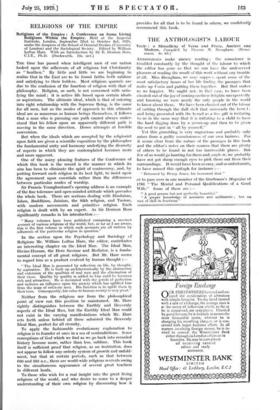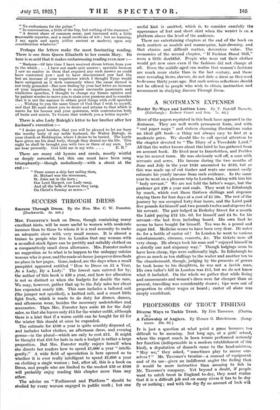THE ANTHOLOGIST'S LABOUR
ANTHOLOGIES make uneasy reading ; the conscience is troubled constantly by the thought of the labour to which the editor has gone. so that we can have the undeserved pleasure of reading the result of this work without any trouble at all. Miss Brougham, we may suppo:e, spent some of the most satisfactory hours of her life finding the passages that make up Varia and putting them together. But that makes us no happier. We ought not, in that case, to have been cheated out of the joy of coming on these delights unexpectedly and knowing we were nearly the only people in the world to know about them. We have been cheated out of the labour
of cutting through the dull shell that surrounds the kern:I ; and being presented with the kernel as a free gift is irritating to us in the same way that it is irritating to a child to have the hard digging done by a grown-up and then to be given the seed to put in " all by yourself."
Yet this grumbling is very ungracious and probably only arises from a guilty consciousness of our own laziness. For it seems clear from the nature of the passages in this book and the editor's notes on their sources that there are plenty of others to be found in not too inaccessible places. But few of us would go hunting for them and, anyh:.w, we probably have not got sharp enough eyes to pick them out from their surroundings. It would have been so easy, and so unfortunate, to have missed this epitaph for instance :—
" Returned by Henry Jones, his borrowed dust " or to pass over in one number of the Gentleman's Magazine of 1761 " The Mental and Personal Qualifications of a Good
Wife." Some of these are :—
" A good person but not perfectly beautiful."
" A proper knowledge of accounts and arithmetic ; but no sort of skill in fractions." " No enthusiasm for the guitar." " In conversation, a little of the lisp, but nothing of the stammer."
" A decent share of common sense, just tinctured with a little seasonable repartee, and a small modicum of wit but no learning, I say again and again (either ancient or modern) upon any consideration whatever."
Perhaps the letters make the most fascinating reading. There is one from Queen Elizabeth to her cousin Mary. Its tone is so acid that it makes embarrassing reading even now
Madame—Of late time I have received divers letters from yow to the which . . . I have not made anie answer ; specialie because I saw no matter in them that required any such answer as could have contented yow : and to have discontented yow had bin, but an increase of your impatience which I thought Tyme would have mitigated as it doth commonly where the cause thereof is not truly grounded—But now finding by your last letter an increase of your impatience, tending to mane uncomelie passionate and vindictive speeches, I thought to change my former opinion and by patient wordes to move you to staie your passions and to consider that it is not the manner to obtain good things with evill speeches . . . Wishing to you the same Grace of God that I wish to myself, and that He maie direct you to desire and attains to that which is meets for his honnor and your quietness, with contentacion both of bodie and minde, Yr Cousin that wisheth you a better mynde."
There is also Lady Raleigh's letter to her brother after her husband's execution :-
" I desire good brother, that you will be pleased to let me bury the worthy body of my noble husband, Sir Walter Raleigh, in your church at Beddington, where I desire to be buried. The Lords have given me his dead body, though they denied me his life. This night he shall be brought you with two or three of my men. Let
me hear presently. God hold me in my wits. . . . E. R."
There are many old hymns and carols, mostly wistful or deeply sorrowful, but this one must have been sung triumphantly—though melodiously—with a shout at the end
" There comes a ship farr sailing then, St. Michael was the steersman, St. John sat in the horn ; Our Lord Harped, our Lady sang, And all the bells of heaven they rang, On Christ's Sunday at morn—"



























































 Previous page
Previous page